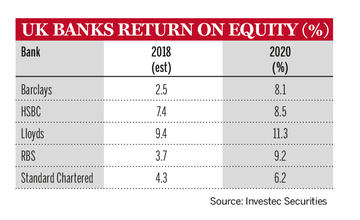Huge amounts of news time have been taken up with the 10th anniversary of the crash and its causes. Some analysts put the blame not on the sub-prime assets that banks were exposed to back then, but on the much earlier cultural shift of banks from being cautious, slow-moving, bureaucratic institutions to their embrace of shareholder returns as growth stocks.
If that was the problem, then on the basis of the growth forecasts for the top UK banks, the regulators can relax. Of the five big UK banks only Lloyds is set to raise its return on equity (ROE) above a rough 10% cost of capital by 2020, according to estimates by Investec Securities (see chart).
Banks are certainly safer in that they are holding three or four times more capital than a decade ago, but the challenge now is finding sufficient income to produce even modest returns.
UK economic growth is unexciting at 1.5%; mortgage and unsecured lending are slow; margins are thin; more lucrative areas such as auto finance are dominated by specialised players. But finding growth is also a problem outside the UK, as shown by ROE projections for HSBC and Standard Chartered, which have a heavy presence in emerging markets. HSBC itself is targeting 11% by 2020 and Standard Chartered 10%.
Investec banking analyst Ian Gordon says: “There are limited opportunities for mainstream banks to grow and our revenue expectations are muted. Banks have fewer sources of income and more limited cross-selling opportunities than they did before the crash."
The positives are that claims for mis-sold payment protection insurance in the UK, and fines more generally for past transgressions, are reducing along with costs. But banks’ good health cannot depend entirely on cost reduction and fewer fines – new avenues of growth will have to be found if the sector is to prosper.
Boring is good compared with the excessive risk taking that led to the crash. It is not good if growth disappears and banks fail to deliver adequate shareholder returns.
Brian Caplen is the editor of The Banker. Follow him on Twitter @BrianCaplen
Register to receive my blog and in-depth coverage from the banking industry through the weekly e-newsletter.





